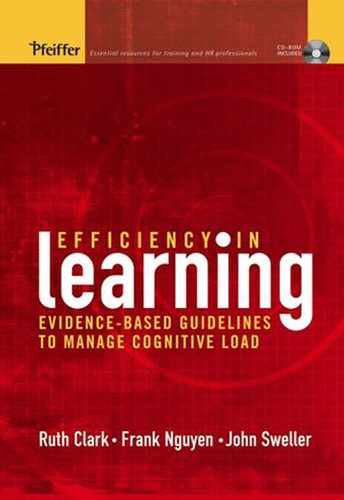IN PART I WE INCLUDE two chapters that summarize the basics of cognitive load theory and that describe its psychological basis. In an age in which workers must learn more in less time, more likely than not, you have taken, produced, or taught training classes that resulted in mental overload. However, you may not realize that cognitive load has a scientific basis—and even better—that research offers many proven techniques that you can use to manage cognitive load either as a consumer or a producer of training. By applying these techniques you can produce efficient instructional environments—environments that result in faster learning, better learning or both.
Cognitive load theory has its modern origins in experiments conducted by Dr. John Sweller at the University of New South Wales, Australia, in the early 1980s. Today cognitive load theory has grown into one of the most widely recognized sets of proven principles governing learning and instruction in the training profession. You can read a personal account by John Sweller of how cognitive load theory started and evolved in Chapter 13. Because most of the research on cognitive load theory is found in technical journals not written for training practitioners, we wrote this book for instructional professionals to summarize the principles and evidence behind it. Part I lays the foundation for these principles.
Read | To Learn About |
|---|---|
Chapter 1. Cognitive Load and Efficiency in Learning | What cognitive load theory is Three Types of Cognitive Load: Intrinsic, Extraneous (Irrelevant), and Germane (Relevant) How instructional environments interact with learner backgrounds and content complexity to result in cognitive load The psychological basis and research evidence for cognitive load theory A formal definition of efficiency in learning |
Chapter 2. The Psychology of Efficiency | Human memories involved in learning: working memory and long-term memory Cognitive load and working memory limits Long-term memory and expertise The main psychological events of learning Instructional methods and psychological events of learning |
Video Interview with John Sweller: Chapter Preview/Review
Chapter 1. Cognitive Load and Efficiency in Learning. The basics of cognitive load theory, including a discussion of extraneous, intrinsic, and germane cognitive load. The scientific basis for cognitive load theory.
Chapter 2. The Psychology of Efficiency. The features of working memory, the consequences of limited working memory on human learning, the features of long-term memory and the importance of long-term memory to human cognition.
The Costs of Inefficient Instruction
What Is Cognitive Load Theory?
A Definition of Cognitive Load Theory
Types of Cognitive Load
Intrinsic Load
Germane (Relevant) Load
Extraneous (Irrelevant) Load
Balancing Mental Load in Your Training
No Yellow Brick Road: The Relativity of Cognitive Load
Cognitive Load Theory and Human Learning
Evidence-Based Practice
Evidence for Cognitive Load Theory
About the Numbers
Limits of Research
Quantifying Efficiency
The Efficiency Graph
The Bottom Line
On the CD
John Sweller Video Interview
Sample Excel e-Lessons
